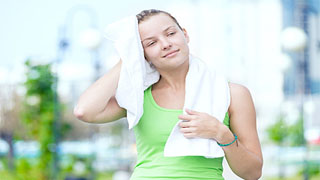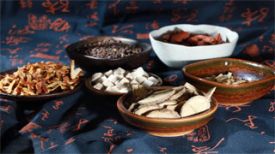
Sweating is a love hate thing - sweating profusely during exercise makes people feel refreshed, sweating all over the body when nervous makes people feel embarrassed, and sweating profusely during fever makes people weak
Sweating is a normal physiological response in humans and an important step in maintaining a constant body temperature. Sweating can be classified as active or passive. Sweating caused by exercise is active sweating, while sweating caused by changes in weather, environment, emotions, and psychology is passive sweating.
When sweating passively, where does the sweat come from and where does the illness come from! Be careful, come and compare it, you won't think of it!
Where does sweat come from, where does illness come from!
Sweating on the forehead=liver yang hyperactivity
If there is often a lot of sweat on the forehead, traditional Chinese medicine believes that it may be caused by liver yang hyperactivity. I suggest you go to the hospital to check if your thyroid hormone secretion is normal, as this is likely caused by excessive thyroid hormone secretion.
Suggestion: Try to maintain a peaceful state of mind and avoid getting angry. Women, especially, should get enough sleep every day, otherwise they are prone to yin deficiency and liver yang hyperactivity.
2 nose sweating=insufficient lung qi
If your nose tends to sweat frequently, it indicates that your lung qi is insufficient and you need to regulate and replenish it. From the perspective of Western medicine theory, your immune system is likely to be low and needs to be improved.
Suggestion: Tap the upper limbs with both hands or tools every day. Among them, the key is to repeatedly tap and press the inner front of the upper limb and the radial side of the thumb, as these are the areas where the lung meridian is distributed on your body. By stimulating them appropriately, the goal of regulating the lung meridian can be achieved.
3 neck sweating=endocrine disorders
The distribution of sweat glands in the neck is sparse, so few people sweat in the neck. If your neck often sweats, it may be related to hormonal imbalances throughout your body.
Suggestion: It is best to go to the hospital for a comprehensive hormone test.
Sweating in the chest=disharmony of the spleen and stomach
If you often sweat in your chest, traditional Chinese medicine says it's because your spleen and stomach are out of balance. Western medicine believes that in this situation, the blood circulation in your body is likely slow and oxygen transport is not smooth.
Suggestion: Don't be overly anxious in daily life, and don't watch horror movies, so as not to be overly frightened and more heartbroken. Eat less greasy and cold food, and drink Huangqi and jujube soaked in water regularly to relieve symptoms.
5. Underarm sweating=excessive sweat glands
There are many large sweat glands distributed under the armpits, so there is more sweat. But if sweat secretion is too vigorous, it is mostly due to the diameter of your sweat glands being too large. If sweat has a strong odor, it is because your diet is too heavy and you have eaten too many foods such as onions, garlic, and onions.
Suggestion: When sweat glands are too large, you can go to the hospital for simple and effective laser treatment. Diet should also be light, with less salt and spices, and eat more fruits and vegetables.
Sweating on the soles of hands and feet=Damp heat in the spleen and stomach
If you are emotionally tense, excited, or scared, and your palms or soles are prone to sweating, traditional Chinese medicine believes that you are likely due to spleen dysfunction, damp heat in the spleen and stomach, and blood deficiency.
Suggestion: Massage the abdomen after meals every day, first clockwise for 30 circles, then counterclockwise for 30 circles. And you should eat less, preferably avoid cold foods such as ice cream, cold drinks, etc.
Sweating on the back=Weakness of yin and yang
There is very little distribution of sweat glands on the back, so sweating on the back indicates that your body's yin and yang are weak and extremely tired.
Suggestion: Ensure sufficient sleep, have a rich and nutritious diet, with a focus on nourishing yin and yang. Women can also do 15 minutes of yoga meditation in the morning and evening.
Pay more attention to the areas of sweat on your body and protect your physical health according to your actual situation.
Moderate sweating, eliminating dampness and coldness
In summer, the human body can naturally sweat, which is beneficial for metabolism and enhances immunity. Sweating is an effective way of detoxification. The human body secretes a large amount of metabolites every day, and various toxins are produced accordingly. The accumulation of toxins in the body can lead to sub-health over time. Sweating more can eliminate excess toxins and water in the body, and also help with skin metabolism, rejecting the troubles of moisture.
Deficiency leads to coldness → coldness leads to dampness → dampness leads to coagulation → coagulation leads to stasis → stasis leads to blockage → blockage leads to tumor → tumor leads to cancer.
Cold and dampness are the root of all human diseases
In traditional Chinese medicine, many diseases are caused by "cold". Modern people's unrestrained staying up late, lack of physical activity, and excessive indulgence in cold drinks are all important factors that cause the invasion of cold pathogens.
Moreover, cold pathogenic factors are easily associated with dampness pathogenic factors and wind pathogenic factors, forming wind cold and cold dampness. In traditional Chinese medicine, it is said that "a thousand cold is easy to dispel, but one dampness is difficult to dispel", which means that cold dampness can harm the body more. For example, the main cause of rheumatic joint pain is cold dampness.
What is the feeling of "cold"?
The constitution of "cold" refers to feeling "afraid of cold, afraid of air conditioning, and feeling cold when sleeping at night", etc;
When a person who is physically weak does not pay attention to clothing in daily life, does not pay attention to covering themselves with blankets when sleeping at night, often blows air conditioning, takes a shower, it is easy for our physical condition to be "cold", especially for women who wear less clothing in their daily lives.
How does it feel to be 2 "wet"?
As the body's "cold" qi becomes heavier and heavier, it becomes easier for the body to enter "wet" qi. A person with a heavy "wet" qi in their body feels heavy and uncomfortable, just like wearing clothes that have been soaked in rain on a rainy day.
Cold and dampness enter the body through five main channels
The "Danzhong acupoint" on the front chest
The "cold dampness" entering from the "Danzhong acupoint" can easily cause breast swelling and pain, breast duct obstruction, lobular hyperplasia, and breast fibroadenoma.
The "Dazhui acupoint" on the shoulders and neck
The "cold dampness" entering from the "Dazhui acupoint" can easily cause shoulder and neck pain, frozen shoulder, cervical spondylosis, dizziness, headache, insomnia, and frequent dreams.
The "Shenque acupoint" located at the belly button
The "cold dampness" entering from the "Shenque acupoint" is prone to accumulate in our pelvic cavity, especially in women. When the "cold dampness" in the pelvic cavity is heavy, it can easily cause various gynecological diseases, such as gynecological inflammation, menstrual disorders, poor menstrual flow, dysmenorrhea, blood clots, uterine fibroids, ovarian cysts, infertility, etc.
If a woman's uterus and ovaries are placed in such a "cold and humid" pelvic environment for a long time, various gynecological diseases are prone to occur, so the female pelvic cavity must be well protected.
The "Gate of Life" acupoint at the waist
The "cold dampness" entering from the "Mingmen acupoint" can easily cause symptoms such as back pain, soreness and weakness of the waist and knees, various kidney deficiencies, and decreased sexual function.
The "Yongquan acupoint" on the soles of the feet
The "cold and dampness" entering from the "Yongquan acupoint" is prone to flow upwards, which can cause symptoms such as joint pain and rheumatoid arthritis. The 'cold and damp constitution' is the root of all diseases, and people with a 'weak' constitution are more likely to have cold and dampness entering our body.
So when the human body feels tired due to various reasons, it can restore physical strength in a timely manner by eliminating cold and dampness and supplementing yang energy, and not let the body organs become "weak" in fatigue; This leads to the entry of cold air into our bodies. In traditional Chinese medicine, it is said that if there is deficiency, it can be supplemented, and if there is cold, it can be heated.
To avoid wind and cold, please be sure to protect these five acupoints in daily life, chest, back, waist, abdomen, and soles of the feet!
The simplest method is to soak your feet at night
The feet are the stronghold of Yin blood, where three Yin meridians converge: the Foot Shaoyin Kidney Meridian, the Foot Taiyin Spleen Meridian, and the Foot Jueyin Liver Meridian. The kidneys generate blood, the liver stores blood, and the spleen regulates blood.
Why can soaking feet in one night replenish blood?
Blood deficiency and blood stasis can cause cold hands and feet, dull tongue texture, blemishes on the face, tightness of the heart, suffocation, and shortness of breath. Soaking feet at night can promote blood circulation and remove blood stasis;
Soaking feet can also unblock the three Yin meridians of the kidneys, liver, and spleen. The method is to add red flowers in hot water (spicy in taste, warm in nature, and suitable for the liver and pericardium meridians, which can break blood, promote blood circulation, harmonize blood, and regulate blood).
2 Tips for Soaking Feet
Soaking feet in spring promotes yang and solidifies the body; Soaking feet in summer to dispel dampness and heat;
Soaking feet in autumn, clearing intestines and moistening lungs; Soak your feet in winter, Dantian is warm.
Constipation - Adding salt to water can relieve fatigue and help with sleep.
Foot odor → Add vinegar to water to eliminate foot odor, prevent and treat athlete's foot, promote blood circulation, and eliminate rheumatism.
Spleen and stomach deficiency - add ginger, tangerine peel, and mint to water to warm the spleen and stomach and dispel dampness and evil.
Dysmenorrhea - Add white peony, motherwort, and Angelica sinensis to the water. Dysmenorrhea is usually caused by body coldness or qi stagnation and blood stasis. White peony can eliminate yin qi, relieve abdominal pain, and smooth blood vessels; Motherwort removes blood stasis and generates new energy, promoting blood circulation and regulating menstruation; Danggui can nourish blood, promote blood circulation, regulate menstruation and relieve pain. It can also make the skin fair and rosy, and improve the problem of cold hands and feet.
Rheumatism and bone pain, fear of cold and coldness → Put dry ginger in water, dry ginger is warm and can dispel cold, restore yang and promote blood circulation.
Diabetes (caused by yin deficiency) → put 10g of astragalus, 10g of bone penetrating herb, 10g of tendon stretching herb, 6g of Chinese prickly ash in the water, remove dampness with Chinese prickly ash, replenish qi and firm the surface with astragalus, and bone penetrating herb can help drugs penetrate into the body through the skin and exert their power.
3 taboos for soaking feet
Avoid soaking feet immediately after eating or on an empty stomach, and wait half an hour after eating.
Avoid excessively high water temperature, it should be 40-50 degrees.
Three taboos: If the duration is too long, it should be around 20 minutes, and slight sweating is sufficient.
Four taboos: make your own decisions and dispose of traditional Chinese medicine indiscriminately.
Women during menstruation or pregnancy, as well as patients with bleeding symptoms, should not soak their feet.


